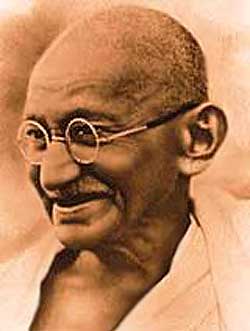Certain actions are obligatory, therefore we cannot escape them
 To this short, imperative indication Kåñna adds another, of a complementary positive nature. In the beginning of Bhagavad Gita, Kåñna says: “Perform the necessary action as I have indicated” (i.e., according to the Karma Yoga principles). And at the end Kåñna reminds us: “It is not necessary to renounce those actions which are correctly integrated and consecrated”. It is important to discover what these ‘indicated’ actions are, “which must be performed”. It is possible that Kåñna refers here to certain special procedures, to certain Yoga techniques, to specific ways of purification and sublimation or to details pertinent to one or another form of Yoga. All these acts “must necessarily be performed” because, “they purify the blood” determining the refinement of the human being and to them Kåñna will refer further. Nevertheless, a further reading of Bhagavad Gita will show that Kåñna does not refer to these kinds of actions.
To this short, imperative indication Kåñna adds another, of a complementary positive nature. In the beginning of Bhagavad Gita, Kåñna says: “Perform the necessary action as I have indicated” (i.e., according to the Karma Yoga principles). And at the end Kåñna reminds us: “It is not necessary to renounce those actions which are correctly integrated and consecrated”. It is important to discover what these ‘indicated’ actions are, “which must be performed”. It is possible that Kåñna refers here to certain special procedures, to certain Yoga techniques, to specific ways of purification and sublimation or to details pertinent to one or another form of Yoga. All these acts “must necessarily be performed” because, “they purify the blood” determining the refinement of the human being and to them Kåñna will refer further. Nevertheless, a further reading of Bhagavad Gita will show that Kåñna does not refer to these kinds of actions.
Nowadays, however, this principle obviously gets a different significance and in order to understand it better, we must refer to the competent opinion of contemporary sages.
For the fortunate ones who are guided by a true guru (not all those who call themselves guru-s are genuine!) the problem is very simple: they must follow as closely as possible the guidance of their spiritual guide in order to elevate themselves inwardly and grow spiritually. For those who don’t have a guru we will refer to the teachings of the great Karma Yogi; Mahatma Gandhi. He said: “the law of activity is the law of life” and we know that for him ‘the law of life’ was the daily request dictated by his consciousness that was tuned in to the divine consciousness. He said: “God created the human being in such a way that he can get his daily food or his daily energy through his work or activity. The one who is eating without working or who is inertly waiting to receive without deserving it or without acting, is a thief”.
Sri Aurobindo said: “We have to obey our ‘social obligations’ in a detached state, but consider them as a true field for Yoga practice” (Integral Practical Yoga).
He considers that every activity is spiritual and useful for the one who performs it with the right attitude of detached integration. In his words: “we should perform all our actions with a detached attitude, in the right state of consciousness and with spiritual integration”.
This way of doing things produces an inner state that is equivalent to a state that follows a successful meditation. In fact for him, “action or activity is nothing else than another specific form of preparation, equally important as Yoga meditation.”
Swami Ramadas also states “The action performed in a state of complete absorption (fusion) into the Supreme Eternal Centre of the universe is that which the sages call yogic action (The Presence of Ram).
In this case, the nature of the action becomes of a secondary importance. Here we can again quote Sri Aurobindo: “We can use any action or activity as a field or area, in which we exercise every moment in the wise spirit of the Bhagavad Gita” (Integral Practical Yoga).
 Swami Vivekananda says about this: “Even the lowest or apparently inferior aspects of activity should not be despised” (Practical Yoga).
Swami Vivekananda says about this: “Even the lowest or apparently inferior aspects of activity should not be despised” (Practical Yoga).
Sri Aurobindo insists: “It is absolutely untrue that physical activity has less value than the sustained mental activity; only the arrogance of the limited intellect can pretend this.” The efficiency of the action that was firmly consecrated and that is performed through and for the Divine is directly proportional to the degree of divine offering. The manual action intentionally performed only for the Divine is superior to the mental activity intentionally performed only for our own egotistical evolution, for personal glory, or for transient mental satisfaction.
According to the Indian tradition regarding Karma Yoga, the choice of actions “which have to be performed” by a certain individual is determined by what in India is called svadharma (The appropriate law). While in the West, the religion, the morality and the law are made of rights and restrictions given in absolute terms, reserving the right for multiple exceptions, the Hinduism gives different rights and duties, sometimes contradictory, to the different groups of people within society. To name just one example: in the West there is an absolute principle preached by the church and applied in court: ” thou shall not kill!” This principle is so strict that it has produced some extreme individuals and social groups that are categorically condemning euthanasia and abortion. To this strict imperative of ‘not killing’ there is a big exception: “During war do all your best to kill the enemy”. And even this calls for an exception: “Do not kill the enemy if he is disarmed, if he surrenders, or if he is already a hostage”. There are many other examples of exceptions. The traditional Eastern teaching has a different approach: it accepts that the ‘duty’ (dharma) is not the same for all, but varies according to age, sex, social status, caste, etc. Thus, everybody has his own individualised duty, his own svadharma.
Here follows some significant examples: in India, people who belong to the caste of Brahmans must strive to be non-violent to such a degree that, with very few exceptions, all Brahmans are strictly vegetarians. Those belonging to the caste of warriors, kñatriyas, have as an essential duty to defend what they deem as being right, using violence if necessary. The head of the family must work to support those who are depending on him. The person who listens to the “divine call” and becomes sannyasin (disciple aspiring to enlightenment) and also the one who (according to a now discontinued tradition) has married his children, these two categories may not work anymore to earn their existence or to provide for others, and must exclusively live from begging when they pursue the spiritual realisation.
“All people” wrote Swami Sivananda, “must fulfil their duty according to the requirements of the social group to which they belong and to the stage of life (ashrama) in which they are” (Teachings of Sivananda). No doubt, this system could not be directly transposed in the West, because in the East the Hindu system of castes plays a very important role. For instance, in a few fishermen communities from the South of India, it is an obligation to throw the net with the left hand and it would be a great sin to throw it with the right hand, while in other fishermen communities in India the opposite must be done. Nevertheless, many problems and inner tensions could be easily solved if we abstain from following blindly and defiantly a very general and apparently absolute rule without filtering it through common sense and intelligent analysis.
It is not without interest to mention here the warning of eastern sages against what we often compliantly call ‘duty’, even if in reality this could be only a well-disguised selfish desire. Referring to this, Swami Vivekananda says: “when an attachment is well rooted we often call it a habit… when the attachment becomes chronic we proudly call it ‘duty’ … Those wishing truly to be Karma Yogi-s must eliminate this false notion of duty.” (Practical Yoga).
 More Eastern sages insisted on the necessity of devoting oneself with priority to what Swami Vivekananda calls: “the duty which here and now is the closest to us”. Mahatma Gandhi explained this aspect in detail in his svadeshi doctrine: “A real adept of the svadeshi doctrine must have as first duty to devote his services and help to his closest neighbours. This will entail the exclusion and even the sacrificing of the interests of the rest, but this exclusion and sacrifice is just an appearance. Through its own nature, the help or service done for the close ones can never result in an obstruction for those that are far away, on the contrary. This is how things are both for the Universe and for the individual, and this is an infallible principle, which should be deeply understood. On the other hand, the one who lets himself be carried away by a ‘faraway landscape’ and who will go to the end of the world to serve, not only will he see his ambition betrayed, but will also not fulfil his duties toward those in his immediate surroundings” (Letters from Ashram by Mahatma Gandhi).
More Eastern sages insisted on the necessity of devoting oneself with priority to what Swami Vivekananda calls: “the duty which here and now is the closest to us”. Mahatma Gandhi explained this aspect in detail in his svadeshi doctrine: “A real adept of the svadeshi doctrine must have as first duty to devote his services and help to his closest neighbours. This will entail the exclusion and even the sacrificing of the interests of the rest, but this exclusion and sacrifice is just an appearance. Through its own nature, the help or service done for the close ones can never result in an obstruction for those that are far away, on the contrary. This is how things are both for the Universe and for the individual, and this is an infallible principle, which should be deeply understood. On the other hand, the one who lets himself be carried away by a ‘faraway landscape’ and who will go to the end of the world to serve, not only will he see his ambition betrayed, but will also not fulfil his duties toward those in his immediate surroundings” (Letters from Ashram by Mahatma Gandhi).
But Gandhi admits in this direction several exceptions: “There can be situations in which the adept of the svadeshi doctrine will be asked to sacrifice his family on behalf of the universal service. This act of freely consented sacrifice constitutes the supreme service which we can bring to the universal family of mankind from this planet”.
The ‘indicated’ or ‘recommended’ action may, on certain special occasions, even imply violence against somebody. Swami Vivekananda said: “The Karma yogi is the one who understands that thehighest ideal is consecration full of ardour and non resistance; as such, the one who understands that this non resistance is the highest manifestation of the power we hold in us, equally knows that what we call ‘resisting to evil’ is also a stage on the path towards the manifestation of non-resistance. But before getting to this supreme ideal, the human being has the duty to oppose and resist evil”. (Practical Yoga).
Mahatma Gandhi himself, the great preacher of non-violence, stated in this direction that “the one who remains the passive spectator of a crime is indeed, even from the judiciary point of view, a participant to that crime”. All these ideas help us understand better why Sri Aurobindo wrote to one of his disciples: “Have no remorse for the time spent in activity and creative work” (Integral Practical Yoga). Swami Sivananda says the same: “The activity performed with completely detached ardour, is the key of Karma Yoga.” (Teachings of Sivananda).
yogaesoteric
Also available in:
 Română
Română
